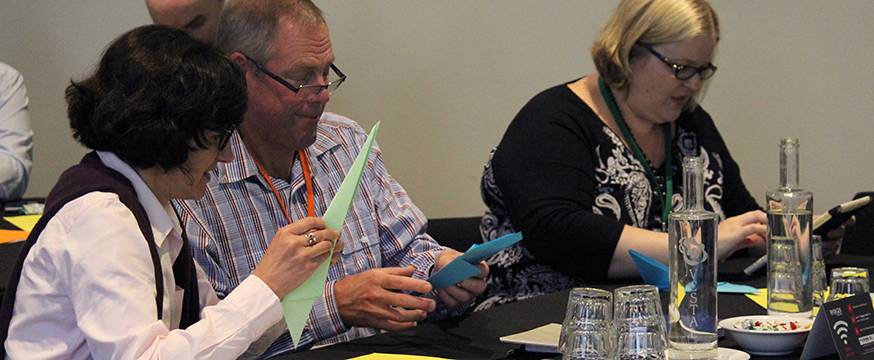
Sharing research and professional knowledge
Research 2 Jun 2014 4 minute readACER’s Excellence in Professional Practice Conference in May brought together researchers, principals and teachers to share their national and international research on school improvement.
While teachers and school leaders are creating and evaluating new solutions to meet specific teaching and learning needs, the opportunity to share these solutions and contribute to a wider professional knowledge base is rare. The 2014 Excellence in Professional Practice Conference, on the theme, Teachers driving school improvement, addressed that need by providing a forum in which teachers and school leaders reported what they were learning about school improvement from systematic studies of their day-to-day practice.
In his opening keynote address, Professor Geoff Masters AO, Chief Executive of ACER, told delegates at the conference that international research reveals how teachers and school leaders are motivated less by financial rewards than by evidence-based and collaborative investigation of programs to support student learning.
‘Incentive schemes are based on the assumption that what is lacking is effort; carrots and sticks are used to encourage teachers and schools to lift their game. But this seriously underestimates the importance of building teachers’ knowledge about how to improve learning and performance,’ Professor Masters said.
‘The performance of Australian schools will not be improved through rewards and sanctions, but by the widespread adoption of evidence-based practices. When teachers and school leaders work together as improvement communities to identify and share effective practices, all students benefit.’
Teachers, principals and researchers contributed more than 60 papers, workshops and poster presentations to the conference. Topics included collaborative professional communities and teaching teams; feedback in induction, teacher observation, mentoring and teacher-student interactions; the use of data to support student learning, identify needs and quantify teacher effectiveness; the use of new technology and apps for real-time data collection; developing, applying and evaluating using new assessment tools; and the impact of school-community partnerships.
Neil Lloyd and Andrea Hayes from the Brisbane Youth Education and Training Centre received the ACER Foundation Award for the most outstanding presentation on school improvement in adversity for their paper, ‘Closing the Skills Gap: An analysis of a school improvement agenda for incarcerated youth.’ Their paper explained the development and implementation of an improvement agenda focused on a targeted school-wide and data-driven intervention to address students’ specific literacy and numeracy deficits through the development of a ‘skills gap’ plan for every student. A further 15 papers received the ACER and Teachers' Mutual Bank Awards for outstanding presentations and are listed on the conference website.
Robert Marshall, Senior Project Director responsible for school improvement at the ACER Institute, addressed recent developments in the ways schools review their practices and plan for improvement through the National School Improvement Tool, an objective standards-based school improvement assessment.
Speaking after the conference, Dr Elizabeth Hartnell-Young, Director of the ACER Institute, said the aim of the conference was to support an improvement community that enables teachers and school leaders to share solutions to specific problems of practice.
‘The shared activities of such an improvement community include understanding starting points, designing possible solutions, monitoring implementation and changes in practice, monitoring student outcomes and evaluating the effectiveness of new solutions through ongoing, iterative “improvement research”,’ Dr Hartnell-Young said.
‘It is teachers and school leaders who drive improvement on the ground, with the support of researchers and professional organisations,’ she said, ‘so it’s vital that we enable all to share their research and professional knowledge. Now that ACER’s Excellence in Professional Practice Conference is a fixture on the education calendar, researchers, teachers and school leaders have a forum in which to do exactly that.’
Further information:
To find out more about the 2014 Excellence in Professional Practice Conference visit < www.acer.edu.au/eppc >. The ACER Institute will host the 2015 Excellence in Professional Practice Conference in Sydney in May 2015.
